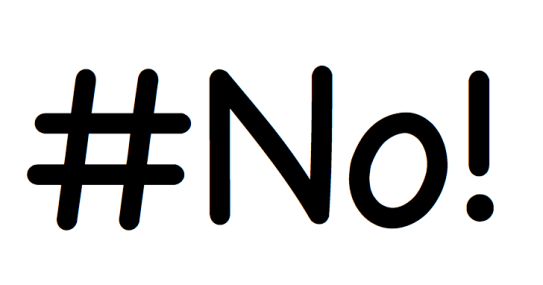No Hashtags
No Hashtags
[Tl;Dr: #No… hashtags are aspirational, not didactic.]
I seem to have been labouring under the misapprehension that most folks in the Twitter software and product development communities have come to understand the mode of use of the various #No… hashtags we see regularly these days. Particularly with the widespread exposure of the mother of them all: #NoEstimates.
(Note: I use the #NoTesting hashtag in a couple of the examples, below, mainly because recent discussions thereon have suggested to me a need for this post.
Invitational
For me, #No… hashtags are a short invitation to interested folks to think again about what, often, are near-autonomic responses. For example, I regard each occurrence of the #NoEstimates hashtag as an invitation to ponder whether, in each case, estimates are giving us value and meeting folks’ needs (in a relatively effective way). An invitation to checkpoint ourselves, and to discuss whether we are just us going-through-the motions without thinking too much about the role of estimates – and estimating – in any particular situation.
Aspirational
Also, I see #No… hashtags as being intended as aspirational: Articulating or labelling a future state where things could be different. Aspiring to change.
For example, I use #NoTesting to advertise my aspirations for a world of development where testing is no longer the chosen path to quality, replaced by other means for more economically delivering products, etc., with agreed levels of quality. So, in that case, #NoTesting really does advertise my aspiration for an end to testing – which I see as hugely expensive and wasteful compared to other, less well-known means – but NOT at the expense of product quality. It also implies – easy to miss, I guess – a responsible, calm, controlled transition from todays’ approaches to that aspirational future state.
“Ask not ‘how are we going to test this?'”
“Ask rather ‘how are we going to ensure this goes out with the agreed levels of quality?'”
“And when you’ve got a handle on that, ask then ‘how are we going to ensure that everything we do henceforth goes out at the agreed levels of quality?'”
Confrontational
And yes, too, #No… hashtags are confrontational. They invite us to challenge ourselves and our entrenched beliefs. To consider change, and its implications. And that’s often uncomfortable, at the very least. Particularly when the topic challenges folks’ self-image, or seems to threaten their accumulated wisdom, reputation and experience, or their livelihoods. I hope we can all see these things in the spirit of mutual exploration, rather than as an opportunity for reiterating entrenched positions and protecting the status quo.
“[#No… Hashtags are] the social media equivalent of poking people with a stick.”
Metaphorical
When I use #No… hashtags, I’m being metaphorical rather than literal. Some folks may not understand this and get upset, by taking them literally. For my part, I believe that’s on them.
For example, with the #NoTesting hashtag, I have had some folks assume that I’m advocating abandoning any concern for the quality of e.g. a product under development. This is not my position. Although denying it seems only to inflame the situation once folks have got their teeth clamped on that particular bone. I guess their assumptions stem from not having knowledge of other means to quality.
In using the #NoTesting hashtag, I’m basically saying “under some circumstances, maybe there are other, more effective means to meet folks needs re: product quality than the default strategy most use today (i.e. testing)”. “How about we talk about those various circumstances, and means?” In this way, #No… hashtags are a metaphor for “would you be willing to think again, and maybe join the search for more effective means, and the contexts in which they might bring benefits?”
Summary
Would you be willing to join me in embracing the #No… hashtag modality, and take each occurrence as an opportunity for a productive and relationship-building mutual exploration of a topic?
– Bob
Further Reading
The Germ Theory of Management ~ Myron Tribus
The Structure of Scientific Revolutions ~ Thomas S. Kuhn


Pingback: Five Blogs – 15 January 2018 – 5blogs
Pingback: Not Obviously Wrong - Softwaretestingtools.com